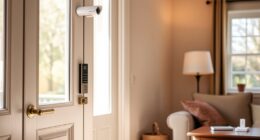Managing sleep disorders in elderly adults starts with understanding how sleep naturally changes with age. Practice good habits like maintaining a consistent schedule, creating a relaxing bedtime routine, and optimizing your sleep environment by keeping it dark, quiet, and cool. Avoid stimulants and heavy meals before bed. If sleep problems persist despite these tips, seek professional help for diagnosis and personalized treatment options. Staying informed can help you improve your sleep quality and overall health—more tips await you.
Key Takeaways
- Establish a consistent sleep schedule and relaxing bedtime routine to improve sleep quality.
- Create a comfortable, dark, quiet, and cool sleep environment to promote restful sleep.
- Limit caffeine, alcohol, nicotine, and screen time before bed to reduce sleep disruptions.
- Seek medical evaluation for persistent sleep issues to identify underlying health or psychological causes.
- Consider behavioral therapies like cognitive behavioral therapy and utilize healthcare resources for tailored treatment.
Understanding Common Sleep Challenges in Aging

As you age, sleep patterns often change, making it common to experience difficulties falling asleep, staying asleep, or waking up feeling unrefreshed. These changes are largely due to sleep pattern alterations that happen naturally over time. One key factor is circadian rhythm shifts, which cause your internal clock to become less synchronized with the day-night cycle. As a result, you might find yourself going to bed earlier or waking up earlier than you used to. These shifts can also lead to lighter, more fragmented sleep, reducing restorative deep sleep stages. Understanding that these changes are normal helps you manage expectations and recognize that sleep difficulties aren’t always a sign of a serious problem, but rather part of the aging process. Additionally, digital health tools can assist in monitoring and improving sleep quality in older adults. Incorporating sleep hygiene practices such as maintaining a consistent sleep schedule and creating a comfortable sleep environment can further support better sleep as you age. Moreover, recent studies highlight the importance of sleep environment modifications to enhance sleep quality in elderly individuals. Furthermore, advancements in automation technology are beginning to offer new ways to help manage sleep disorders through personalized interventions.
Lifestyle Changes to Promote Better Sleep

Implementing simple lifestyle changes can markedly improve your sleep quality. Prioritize good sleep hygiene by maintaining a consistent sleep schedule, even on weekends, and creating a relaxing bedtime routine. Make your sleep environment comfortable—dark, quiet, and cool. Avoid caffeine, alcohol, and heavy meals before bed, as they disrupt sleep patterns. Incorporate relaxation techniques such as deep breathing, meditation, or gentle stretching to calm your mind and body before sleep. Limiting screen time at least an hour before bed helps reduce blue light exposure, which can interfere with melatonin production. Using a self-watering plant pot can serve as a calming activity that promotes mindfulness and relaxation before bedtime. Selecting keto-friendly ingredients for evening snacks can also support better sleep by stabilizing blood sugar levels. Additionally, ensuring proper air purifier maintenance can help create a cleaner sleep environment by reducing airborne irritants. Regularly cleaning your sleep space can further reduce dust and allergens that may disturb rest. Creating a calming bedtime routine that incorporates aromatherapy or soothing sounds can further enhance your ability to fall asleep and stay asleep. These small adjustments can significantly enhance your ability to fall asleep and stay asleep, leading to better overall rest and improved daytime alertness.
Medical Interventions and Treatments

Medical interventions and treatments can effectively manage sleep disorders in elderly adults, especially when lifestyle changes alone are insufficient. You might consider pharmacological options, which include medications prescribed to improve sleep quality or address specific issues like insomnia or sleep apnea. Before starting any medication, your healthcare provider may recommend sleep study procedures to diagnose underlying conditions accurately. These procedures help identify problems such as restless legs syndrome or breathing irregularities during sleep. Incorporating testing methodologies ensures comprehensive assessment and targeted treatment plans. Additionally, understanding the Mental Wellbeing Index can support the overall mental health of elderly individuals undergoing treatment. Regular monitoring and adjustment of treatments, guided by clinical assessments, are essential for optimal outcomes. Moreover, integrating nutritional insights such as vitamin and mineral balance may support overall sleep health during treatment. Considering the state-specific regulations around medications can also influence treatment options and compliance.
Creating a Sleep-Friendly Environment

Creating a sleep-friendly environment is essential for improving sleep quality in elderly adults. You can enhance sleep hygiene by establishing a consistent bedtime routine and avoiding screens before bed. Bedroom optimization involves making your sleeping area comfortable, quiet, and dark. Use blackout curtains and consider earplugs or white noise machines to block disruptive sounds. Keep the room at a cool, comfortable temperature to promote better sleep. Remove clutter and distractions to create a calming space. Invest in a supportive mattress and pillows that suit your needs. Limiting caffeine and heavy meals before bedtime also supports better sleep hygiene. Additionally, color accuracy impacts overall image quality and can influence visual comfort, which is important for creating a relaxing sleep environment. Paying attention to lighting quality can further enhance sleep conditions and reduce insomnia. Using appropriate ear protection like earplugs can significantly diminish nighttime disturbances, especially in noisy environments. Maintaining proper ventilation also helps regulate air quality and temperature, contributing to restful sleep. Adequate air circulation can prevent stuffiness and promote a healthier sleeping space. By making these adjustments, you create an environment that encourages restful sleep and reduces the chances of waking during the night.
When to Seek Professional Help

If you notice persistent sleep problems despite making environmental adjustments, it’s important to recognize when professional help is needed. Poor sleep hygiene, ongoing insomnia, or daytime fatigue may signal underlying issues. Consider seeking help if:
- Sleep difficulties last for weeks despite good sleep habits
- You experience daytime impairments like memory problems or mood changes
- Sleep issues interfere with daily activities or safety
A healthcare professional can evaluate potential causes and recommend treatments like cognitive behavioral therapy, which effectively addresses sleep disorders. They might also explore medical factors contributing to your sleep problems. Additionally, understanding sleep disorders can empower you to make informed decisions about your health. Recognizing underlying medical conditions that disrupt sleep is crucial for proper treatment. Being aware of psychological factors can also help address underlying contributors to sleep disturbances. Incorporating mindfulness techniques into your routine may also support better sleep quality. Remember, early intervention can improve sleep quality and overall health, so don’t hesitate to reach out if self-care strategies aren’t enough. Recognizing when to seek help ensures you get the support necessary for restful, restorative sleep.
Frequently Asked Questions
Can Sleep Disorders in Elderly Adults Be Completely Cured?
You might wonder if sleep disorders in elderly adults can be completely cured. While sleep medication can help manage symptoms, it often isn’t a permanent solution. Improving your sleep environment, like reducing noise and light, can substantially enhance sleep quality. However, some issues may persist, so combining lifestyle changes with medical advice offers the best chance for better sleep, even if a complete cure isn’t always possible.
How Do Dietary Habits Affect Sleep Quality in Seniors?
Imagine a senior who sleeps better after adjusting meal timing and incorporating dietary supplements like magnesium. Your dietary habits profoundly influence sleep quality; eating heavy meals late can cause discomfort, while earlier meals promote better rest. Consuming sleep-friendly foods and maintaining regular meal times can improve sleep. Be mindful of dietary supplements that support relaxation, but always consult a healthcare professional. Your diet plays a vital role in achieving restful sleep.
Are There Natural Remedies to Improve Sleep in Older Adults?
You can try natural remedies like herbal supplements such as valerian root or melatonin to boost sleep quality. Additionally, practicing good sleep hygiene—like maintaining a regular sleep schedule, avoiding caffeine before bed, and creating a calming bedtime routine—can notably improve your sleep. Combining these approaches often helps older adults fall asleep faster and enjoy more restful nights without relying on medication.
How Do Cognitive Decline and Sleep Disorders Influence Each Other?
You should understand that cognitive decline and sleep disorders deeply influence each other. Poor sleep hampers brain function, making memory loss and confusion worse, while cognitive decline can disrupt sleep patterns. As you experience sleep issues, your brain’s ability to consolidate memories diminishes, accelerating decline. Better sleep supports brain health, which can slow cognitive deterioration. Addressing both aspects is essential to maintaining better overall mental function and quality of life.
What Role Does Physical Activity Play in Managing Sleep Issues?
Ever wonder how physical activity can transform your sleep? You might be surprised to learn that regular exercise routines can boost your sleep quality, helping you fall asleep faster and stay asleep longer. Incorporate relaxation techniques alongside activity to maximize benefits. Exercise releases endorphins, reducing stress that disrupts sleep. So, start moving today—your better sleep might just be a few steps away, waiting to be unveiled.
Conclusion
Think of your sleep as a delicate lantern—when properly cared for, it shines brightly through the night. By understanding your sleep challenges, making simple lifestyle adjustments, and seeking help when needed, you keep that lantern flickering steadily. Creating a peaceful environment acts as a gentle breeze, guiding your sleep home. Remember, you hold the key to restoring your restful glow—nurture it, and let your dreams illuminate your days.









